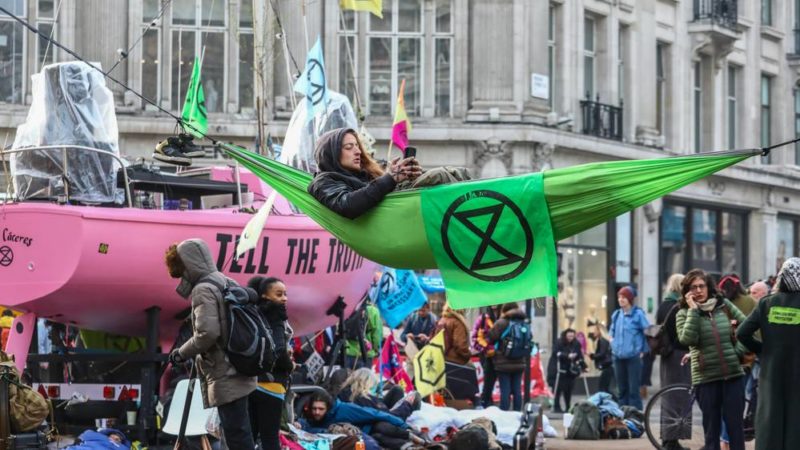
Most of us who work in or travel through central London will have encountered Extinction Rebellion over the last few days. The climate change protestors have shut down parts of the city by occupying public spaces like Oxford Circus, Waterloo Bridge and Parliament Square.
XR has mobilised an impressive number of activists to take part in nonviolent direct action highlighting the climate emergency. Although there are certain elements of the movement that can and should be criticised from the left, it is undeniable that what they’ve achieved is impressive. Mobilisation and awareness-raising on this scale over climate issues is a good thing.
Some Labour activists have taken part in XR actions individually, but the organised left and the labour movement are not visibly involved in this protest. Just as they did when Remainers marched against Brexit, some Labour members have been quick to dismiss XR as a middle-class vanity project for those who don’t have to be concerned about its disruptive impact on the daily lives of working people in the capital. Others have pointed to a lack of diversity or coherent political programme.
There will be middle-class elements in XR, and questions around diversity and political coherence should always be raised, as organisers must be challenged on their strategy and tactics. But from a visit to the camp on Parliament Square, I can say that I was impressed and happily surprised by what I saw – political talks highlighting the need for international solidarity, with speakers critiquing neoliberalism and its impact on the environment, and a large contingent from the Kurdish Solidarity Campaign discussing their goals.
Both the Remain campaign and XR tap into the Zeitgeist – Brexit and climate crisis are two defining political challenges of our time. But on both, the organised left is not taking a leading role in shaping civil society’s response. Left-wing activists and groups decided to join Labour to help get the party into power when Jeremy Corbyn was elected as leader. The left knows that a change of government is hugely significant if we want to implement policies that will improve working people’s lives. But the absence of the organised left in social movements outside of narrow party politics is worrying.
Corbyn’s leadership has put issues of equality, social justice and redistribution of power on the agenda. And yet Labour’s electoral coalition, and different power players within the party machine, means we face huge challenges when trying to implement radical policies.
On Brexit, Labour has followed the path of ‘constructive ambiguity’ to accommodate both Leave-voting Labour areas in the North and metropolitan areas such as London and Bristol. Labour is walking a tightrope: one false step could cause a key group of supporters with contrary priorities to withdraw from the party. We would struggle to win a general election if either of the camps break away.
Likewise on immigration, Labour is torn between those who argue that the 2016 vote is a mandate for immigration control – therefore we should pledge to end free movement and implement a skills-based visa system similar to what the government has proposed – and those who call for the abolition of detention centres and deportations, who want to see a Labour Party making radical demands around the nation state and border controls.
We have seen similar tensions play out when it comes to climate issues. Labour’s official position was to oppose the expansion of Heathrow Airport but Unite the Union is in favour of a third runway. In parliament, Labour MPs were given a free vote on expansion.
A change of government in itself – even a Corbyn government – does not guarantee radical change. The way to develop and implement left-wing policies is paved with complex decisions, taking into account different interest groups, with possibly watered-down results. That’s why it is essential for the organised left to be present in social movements, shaping them to influence public opinion. A left that is focused solely on winning elections will lose touch with the grassroots it claims to represent.
Movement-building, direct action and organising on our streets is an important and proud part of the left’s struggle. Corbyn’s leadership was supposed to open the Labour Party up to build a mass movement. But we have seen little of this so far: successful mobilisation is still measured by how many people turn up to knock on doors or attend a CLP meeting, rather than our involvement in grassroots campaigns. Putting all our eggs into the electoral basket makes a right-wing backlash against a future left-wing government more likely.
Momentum is showing the way. It is using its organising power to mobilise activists to target Barclays branches across the country over their fossil fuel investment. This is a positive step in the right direction. Momentum must not exclusively focus on turning out votes for internal election battles.
This should be replicated on a Labour Party level, too. The national executive committee (NEC) and regional boards should become more proactive in developing political campaigns around the politics that Corbyn is arguing for, giving support to local parties that will encourage action in our communities. An engaged public and a critical, demanding grassroots left is essential if we want Labour to stay on track and transform this country.




More from LabourList
Letters to the Editor – week ending 15th February 2026
‘Labour council candidates – it’s tough, but all is not lost’
‘Labour won’t stop the far right by changing leaders — only by proving what the left can deliver’